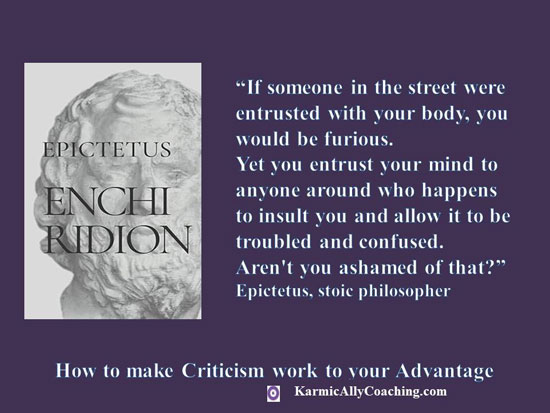
Most of us tend to be wary of criticism, especially when we’ve worked hard on something and feel we deserve a pat on the back. Naturally you’ll get upset when you’re criticized!
It’s human to not want to hear something contrary to what we want. It doesn’t just include a toxic boss or co-workers but can also include constructive criticism.
That’s how I turned around the situation when I missed a coveted promotion into a learning opportunity. It stood the rest of my corporate career in good stead and made sure I adopted a growth mindset.
The promotion was a precious one with a pay increment, but I missed out because one manager decided that I wasn’t ready and needed to ‘stop being so nice’.
Want to know what the managers thought was the cure?
6 months in the Insolvency Department being shouted at by upset creditors of insolvent clients!
The good news is that I became more assertive, made new friends at work with who I’m still in touch even after 37 years and got the promotion with pay increment.
I know this may sound counter-intuitive, but sometimes a critique can be the most impactful thing someone can offer you. It all comes down to what you decide to do with it.
So why not make criticism work to our advantage?
If you’d like to discover how to make criticism work for you, rather than derail you, read on.
Create distance between what is being said and your sense of self-worth
When someone says something critical about you, you have some choices to make. Of these choices, one of the most significant is whether or not you choose to be offended.
The stoic philosopher Epictetus said this on the subject, “If someone in the street were entrusted with your body, you would be furious. Yet you entrust your mind to anyone around who happens to insult you and allow it to be troubled and confused. Aren’t you ashamed of that?”
Don’t fall into the trap of allowing the opinions of others to control your emotions and take charge of your mind.
Recognize that someone’s thoughts about you only have the significance you afford them. Decide how you will feel and see the foolishness of letting other people’s words control you.
This recognition creates distance between what is said and your sense of self-worth.
It is a powerful tool to assist you in navigating snares of modern life such as the attention economy and cancel culture.
Allow life to be your teacher
Choosing to learn from each experience you have is profoundly empowering. You don’t have to agree with people or even think they’re intelligent. The important thing is that you can garner lessons from everything you encounter in life.
When someone criticizes you, it’s a great opportunity. When you choose to create distance and not allow words to offend you, you now have the chance to scan over what was said and see if there’s anything useful there.
You’re ready to learn and grow if possible, transforming the encounter from a trial to a win.
Embrace the process and move forward
Sometimes a little humility goes a long way. When we acknowledge that we’re all works in progress, it doesn’t hurt so much to encounter criticism. Instead of feeling embarrassed or belittled, you can figure out how the observation might pave the way for improvement.
After all, a lack of growth often leads to stagnation. So we should embrace the process, relishing opportunities to break the mold and move forward.
Criticism can actually cultivate creativity
Sometimes hearing what is wrong with something you’ve done can pave the way for innovation.
For example, when someone presents you with issues in a proposal you present, or holes in a story you’ve written, it can reveal new ideas that were previously obscured from your view.
This expanded vision is a part of how collaboration works, making more minds better than one.
According to Harvard Business Review, there’s a sweet spot in criticism that recognizes the flaws in something without throwing the baby out with the bathwater. They refer to this process as “yes, but, and.”
In this scenario, the “yes, but” portion presents the issue with a presented idea, while the “and” portion presents potential solutions.
By approaching a discussion this way, the critique becomes an invaluable method for creating novel solutions without disregarding a person’s initial concept.
Showing regard for other people’s feelings and perspectives while giving constructive criticism makes for more thorough communication and better outcomes.
Final Thoughts
It isn’t all bad to be criticized, even when your critic has questionable intentions. Choose to analyze a person’s words, scan them for utility, and refuse to take them personally. That way you will always learn from the encounter.
The freedom from releasing the perception of insult paves the way for vast personal improvement while removing potential suffering. It enables us to benefit from a growth mindset too.
The benefits of criticism are amplified when it is used constructively amongst respectful individuals.
In this ideal scenario, you will be encouraged to elevate your ideas and hone your skills, while being free from personal attack. Thus, being amongst good company is another potent way to make criticism work for you.





 I adhere to the Certified Coaches Alliance Code of Ethics and Standards. A copy is available on request.
I adhere to the Certified Coaches Alliance Code of Ethics and Standards. A copy is available on request.
 Let's Talk through the Connect Form:
Let's Talk through the Connect Form: